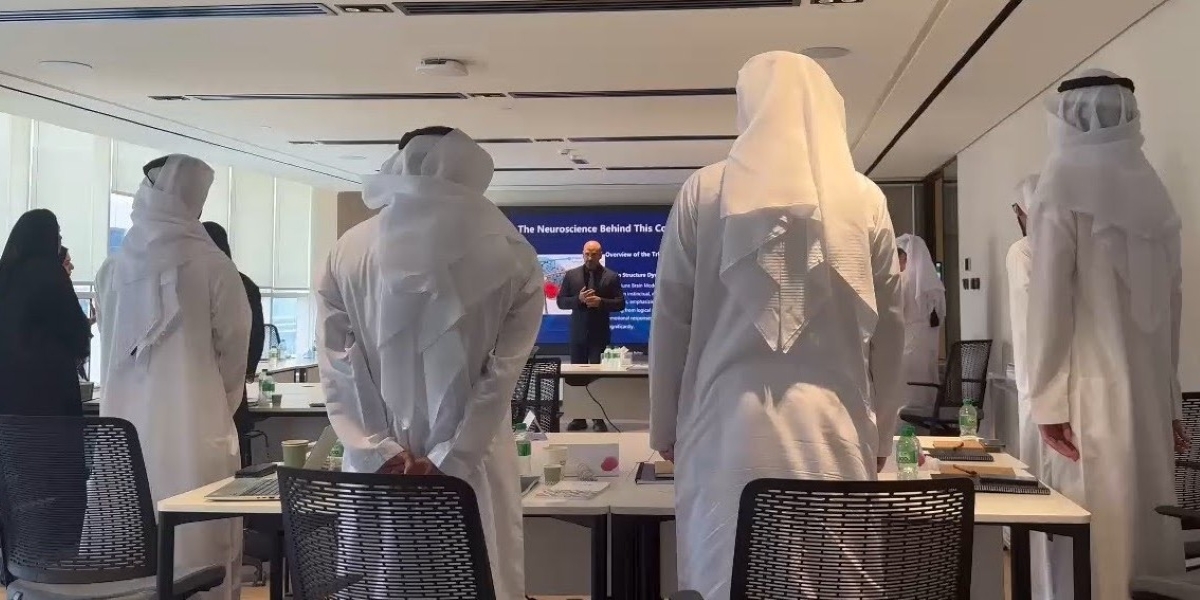By: Mae Cornes
In a complex the size of a small city, where petrochemical processes run around the clock and thousands of professionals coordinate across divisions, Sharif Abdunnur discovered that critical breakdowns were not mechanical. At a petrochemical company, one of the major integrated facilities in the Middle East, entrenched communication patterns had created silos that undermined operational efficiency and turned routine disagreements into persistent conflicts. Abdunnur, a corporate facilitator with over two decades of experience in organizational psychology, designed an intervention to reach 60 professionals directly and reshape the communication culture of an entire department.
Building a Framework for Organizational Change
Between November 2024 and September 2025, Abdunnur led a three-cohort program that targeted a fundamental problem: employees at the petrochemical company had learned to avoid conflict rather than resolve it constructively.
Abdunnur structured the program around established behavioral science tools, including the Thomas-Kilmann Conflict Mode Instrument, which measures how individuals balance assertiveness and cooperation when handling disagreements. He incorporated the Harvard Negotiation Model for structured problem-solving. He created gamified simulations such as The Perspective Switch and The Root Cause Maze, designed to activate empathy and systemic thinking among participants who rarely interacted across departmental boundaries. The program was delivered bilingually in Arabic and English, ensuring that cultural and linguistic differences did not become barriers to engagement.
The results were immediate and measurable. Participants achieved knowledge gains of 40-60 percent between pre- and post-assessments, with several individuals demonstrating a 90 percent improvement in comprehension and conflict-handling confidence. Abdunnur’s effectiveness as a trainer was scored 9.9 out of 10, while engagement and interactivity received perfect ratings from participants who described the sessions as inclusive and well-structured. The Net Promoter Score ranged from 9.6 to 10, with every participant indicating they would attend future programs facilitated by Abdunnur. The Global Recognition Awards, which evaluated his application using the Rasch model for precise measurement across diverse areas of excellence, recognized his work with a 2025 Global Recognition Award.
Sustained Behavioral Shifts Beyond the Classroom
Within three months of program completion, the petrochemical company’s human resources department reported a 20-25 percent reduction in interpersonal conflict escalations. Cross-departmental communication improved measurably, decision cycles accelerated, and problem-solving approaches became more collaborative as teams applied the frameworks introduced during training. Participants independently launched internal Listening Circles and Peer Dialogue Hubs, extending facilitation practices beyond the original classroom setting and creating mechanisms for ongoing organizational development that required no additional external intervention.
The qualitative impact proved equally significant. One delegate wrote, “Pausing to listen and understand before responding has improved my relationships at work and at home.” Another participant from the operations division noted, “The program changed how we handle conflict. Listening before reacting has made our team meetings smoother and more productive.” The learning and development manager at the petrochemical company observed, “Dr. Abdunnur’s facilitation changed how our managers communicate, resulting in calmer dialogue, quicker resolutions, and greater team cohesion within weeks of program completion.”
These testimonials reflected a consistent pattern of behavioral change that extended beyond surface-level skill acquisition. Management considered the initiative a significant learning intervention for the company, noting improvements in meeting dynamics, team morale, and cross-functional harmony. The shift from reactive behavior to reflective leadership altered how participants approached professional and personal relationships, demonstrating the depth of change achieved through Abdunnur’s carefully structured methodology.
A Philosophy Centered on Collective Intelligence
Abdunnur distinguishes his approach through what he terms neuroscience-driven facilitation, blending analytical models with embodied learning, humor, and storytelling that convert complex behavioral science concepts into practical experiences participants can immediately apply. Real operational case studies from the petrochemical company’s industrial environment helped align facilitation design and organizational reality, driving retention and results that persisted long after formal training sessions concluded. His facilitation philosophy centers on one principle: facilitation awakens the collective intelligence of a group, rather than simply transmitting information from the facilitator to the participants.
Abdunnur holds a doctorate and serves as a faculty member and professional trainer at Informa Connect Academy. He has authored multiple publications on communication and emotional intelligence, and his work embodies the International Association of Facilitators’ Core Competencies, which emphasize encouraging participation, managing group dynamics, guiding consensus, and ensuring alignment with organizational outcomes. Participants at the petrochemical company received structured tools, including Story Circles, Empathy Mapping, and Reflection Huddles, to build trust and shared vulnerability, creating psychological safety that enabled behavioral change rather than superficial compliance with new communication protocols.
The integration of technology into education enabled Abdunnur to systematically track progress while adapting his approach based on real-time feedback from participants who used digital assessment tools throughout the program. His contribution to curriculum development extended beyond this single initiative because the frameworks he created at the petrochemical company have been adapted for use across other divisions and departments within the organization. Alex Sterling, spokesperson for Global Recognition Awards, observed, “Dr. Sharif Abdunnur’s work demonstrates how expert facilitation can reshape organizational culture, creating lasting change that ripples far beyond the initial intervention, while his ability to combine rigorous methodology with genuine human connection sets a standard for excellence in corporate education.” For the petrochemical company, the shift was not just about reducing conflicts but about building a culture where communication became a driver of collaboration across professional and cultural boundaries.









